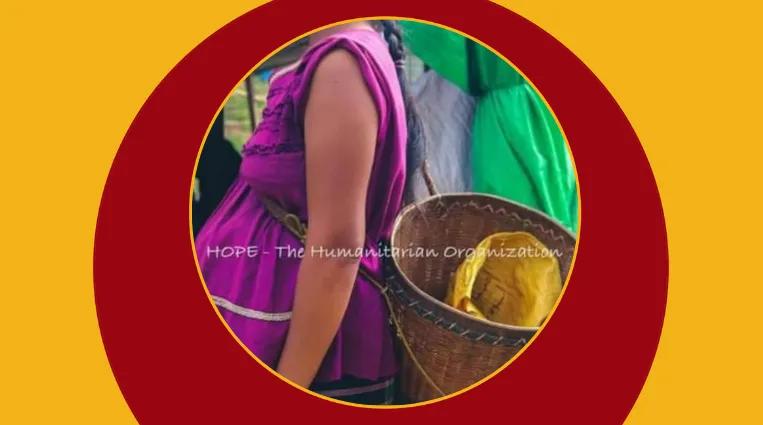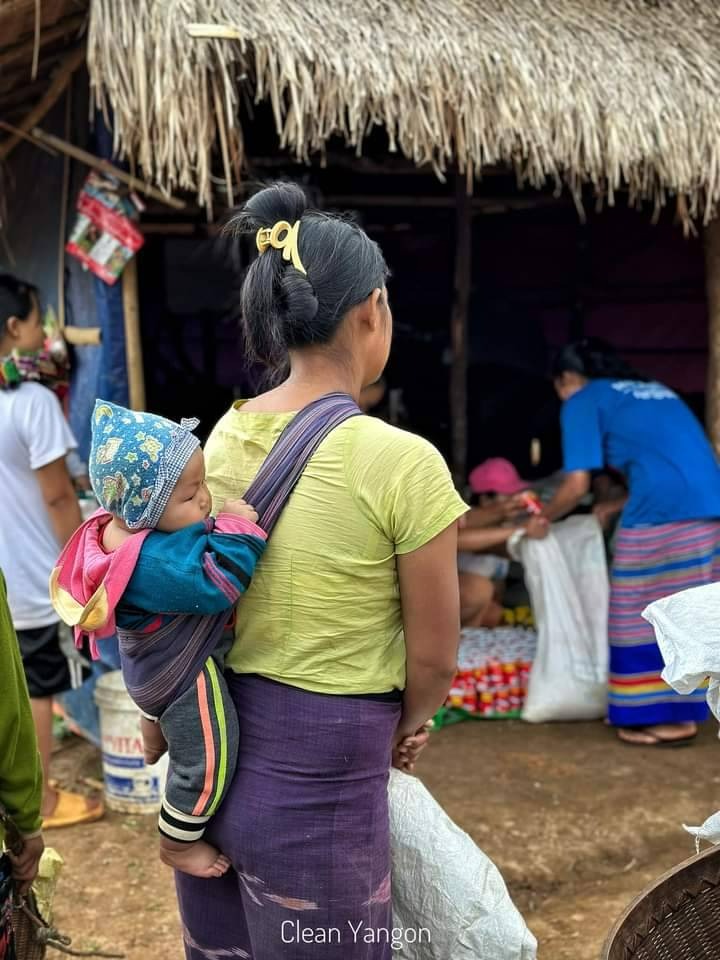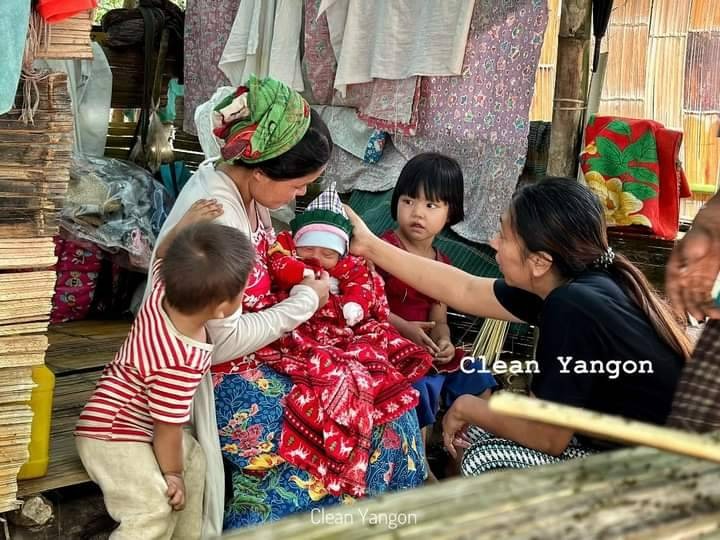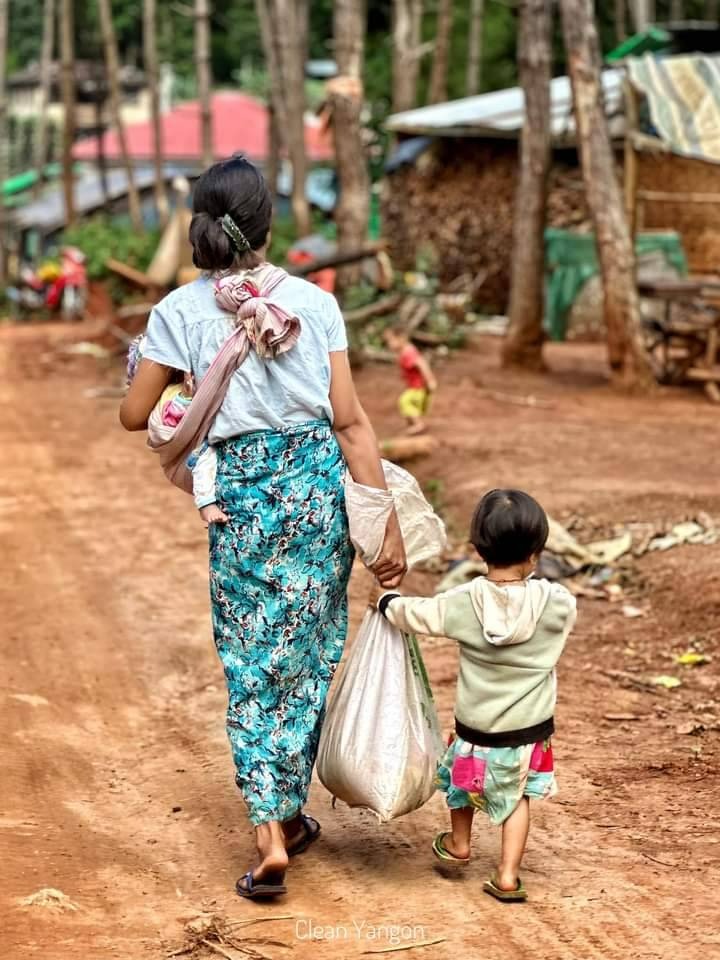The Untold Story of Pregnant Women in War Zone
11 May 2024

Devi
Ma Nu Yi (not her real name) continues to feel sorrow when reflecting on her nightmare from the past two years, which involved the loss of her new born baby after a full nine months of pregnancy.
During that period, a fierce battle intensified between the local civilian defense forces and the Military Council troops, leading the local population to flee their homes. Ma Nu Yi, a resident of the village, was among those who had to run from the fighting, even though she was heavily pregnant. She gave birth to her baby while hiding as a displaced person where she had no access to medical facilities or hospitals. Consequently, the newborn baby did not survive.
“I shed tears every time I recollect that incident. If not for the military council troops’ actions, I might not have had to endure this nightmare. Whenever I think of my baby, it brings me to tears,” said Ma Nu Yi, a resident of Kanpetlet Township, Chin State.
It was their first child, and the incident deeply saddened both Ma Nu Yi and her husband. Due to the emotional stage she was in, Ma Nu Yi found it difficult to prioritize her own healthcare in the aftermath of the delivery.
Throughout her pregnancy, she lacked regular access to medical care due to their displacement. When it was time for her to deliver, a nurse advised her to go to the township hospital, but she faced challenges reaching it and ended up giving birth where she was hiding.
Ma Nu Yi said that they made an attempt to reach the hospital, but due to ongoing battles in the area, there was a significant delay. Thus, her baby remained in her womb for an extended period, and when the infant was eventually born, it struggled to breathe due to exhaustion.
“I had tried to go to the hospital, but there were no available cars due to the ongoing battle. So, I requested the nurse to assist me in delivering the baby right here,” she added.”
Incidents like these did not happen to Ma Nu Yi alone. It was unfortunately a common occurrence that, while fleeing from the conflict, many pregnant women faced the risks of miscarriages, malnutrition, lack of access to healthcare, and the inability to deliver safely. These difficulties often lead to the loss of babies, even after their birth.
Following the birth, children did not receive the necessary vaccinations or basic health care either.
Due to the ongoing fighting with the military council troops, the population of displaced individuals continues to grow, and they are facing severe challenges in accessing food, water, medicine, and healthcare. These shortages have a particular impact on pregnant women, maternity women, infants, and the elderly.
“Given that we’re on the run from the conflict, it’s extremely challenging to secure nutritious meals. Even if we have the money in hand to purchase food, it is no simple way to access. Everyone here is encountering hardships,” remarked Ma Soe Myar (not her real name), a displaced individual from Kayah State.
“Since IDPs are dependent on donated food supplies, there remains an ongoing need to ensure that pregnant women have access to nutritious meals,” said, Ma Soe Myar
Ma Soe Myar and her husband lived in Tarchileik Township, Shan State and when she was six months pregnant, she went back to her hometown, Moe Byae, Karenni (Kayah) State where her mother lived. She had returned home due to unavoidable reasons, however, she faced so many difficulties because of fierce fighting. Her parents had to leave to escape from the fighting and she had to follow them. While living as IDPs, she had to endure not having enough food, faced with water shortages and limited access to medical facilities and medicines.
When she was almost about to give birth and was having stomach pain, she went to the midwife who was living not far from her place. While she was giving birth with so much pain, she heard guns being fired, and artillery shelling by the military council troop.
“There are various needs among the IDPs, especially pregnant women and breastfeeding mothers. Infants under three months are particularly vulnerable and are suffering, as they lack access to healthcare,” she pointed out.
Internally Displaced Pregnant women are worried about their unborn children due to insufficient nutrition.
She could not bring her month-old child to the clinic since there is no clinic. Thus, she had to rely on any available traditional medicine. Children do not receive any vaccinations that should be given according to their age.
On the 8th of March, International Women’s Day, the Karen Human Rights Group (KHRG) released a report stating that mothers and pregnant women who are fleeing from the conflict, are facing numerous difficulties in giving birth and for the development of the children.
The KHRG statement mentioned that thousands of civilians, including women and children from Southeast of Burma, have fled from raging armed conflicts. While living in the IDPs areas, women have faced physical insecurity, food insecurity, poor sanitation, Covid-19 pandemic, seasonal illnesses, bad weather and many other unpredictable threats.
“Since it is a war zone, pregnant women had to run from the fighting, from the bombing. We had to hide in the bunker and do not have enough food to eat,” said Ma Mu Mu, resident of Hlaingbwe Township, Karen State and who gave birth while fleeing from the fighting.
She considers herself fortunate when compared to other mothers, as she has access to a clinic provided by the local resistance armed group in her region. While her situation may not be as bad as other mothers from other areas, she still faces risks and challenges.
“I can go to the clinic in this area but life is still difficult since this place is also a war zone,” said Ma Mu Mu.
She continued saying that while she may not have a hard life that of other pregnant women in other regions, she had to give birth with anxieties because there was flood in Karen State.
The whole township was affected by flood, transportation was incredibly difficult. It took her approximately four hours to reach the clinic, a journey that, under normal situation, would only take 30 minutes.
“Due to the flood, I had to go by boat and then continued with a car. The car couldn’t proceed any further due to the heavy flooding near the hospital. I was anxious that I might have to give birth outside the hospital, since the pain had increased,” described Ma Mu Mu.
Due to the instability as a result of the military coup, the healthcare for mothers and children has decreased, pregnant women have faced life-threatening situations during their child birth.
According to the relief worker for IDPs in Kani area, even though there is no specific and detailed data on the death of pregnant women and child mortality, but pregnant women who are fleeing from the war are facing with no access to health care, give birth while fleeing in the jungle, no nutritious food and as a result both children and mothers face with malnutrition, and miscarriages.
“Since pregnant women do not have notorious food, some could not give birth because they are weak. The important matter is that new born children do not get vaccinated. As for those who have some money, they can go to other cities and deliver the babies and have them vaccinated, but the majority of pregnant women and newborn children do not get this opportunity,” he added.
“It has been noted that pregnant women, both the mother and child, require nutritious food. Unfortunately, those who are fleeing from the conflict are unable to access it. The ongoing battles, these pregnant women find it extremely challenging to secure proper nutrition. Even if they have the money to purchase food, the circumstances prevent them from obtaining it” said Sister Fransiscer who is helping with the IDP in the Karenni area.
“In normal circumstances, it is recommended that mothers consume double the usual amount of food for the sake of their baby. However, for those displaced by conflict, they struggle to have even one meal,” Sister Fransiscer remarked.
Despite there being some clinics run by CDM doctors and nurses, due to the difficulty of the transportation and security concerns, given the distances, the IDPs do not go to get treated. They only get healthcare from the mobile clinic that arrives at their places; she continues to explain.
Given this situation, she is concerned that pregnant women may not receive consistent healthcare or access tovaccination for their newborns after giving birth.
Additionally, Sister Fransiscar noted that there should be enough time for the women to rest during pregnancy and also after giving birth. However, pregnant women and mothers from the IDPs areas are living with both physical and mental insecurity.
Due to the ongoing gunfire and daily air strike, pregnant women and children are running to seek refuge in the bunker and have to stay under the rain.
“There was a mother who had just given birth to her baby five days ago, and she had to endure an entire night in the rain. There is no safe shelter for mothers and infants but they have to withstand and keep on going,” Sister Fransiscer remarked.
Pregnant women in IDP areas persist in their struggle for survival, but their ultimate desire is for peace and the opportunity to return to their homes, where they can live in tranquility.
Given the uncertainty regarding the duration of the conflict, these mothers from IDP areas want the urgent need for a safe place, food and medicine, and comprehensive healthcare for pregnant women, mothers, and children.
Announcements
21 May 2025
Open letter: Malaysia must lead ASEAN with principle, not hypocrisy, to address the Myanmar crisis

Progressive Voice is a participatory rights-based policy research and advocacy organization rooted in civil society, that maintains strong networks and relationships with grassroots organizations and community-based organizations throughout Myanmar. It acts as a bridge to the international community and international policymakers by amplifying voices from the ground, and advocating for a rights-based policy narrative.


